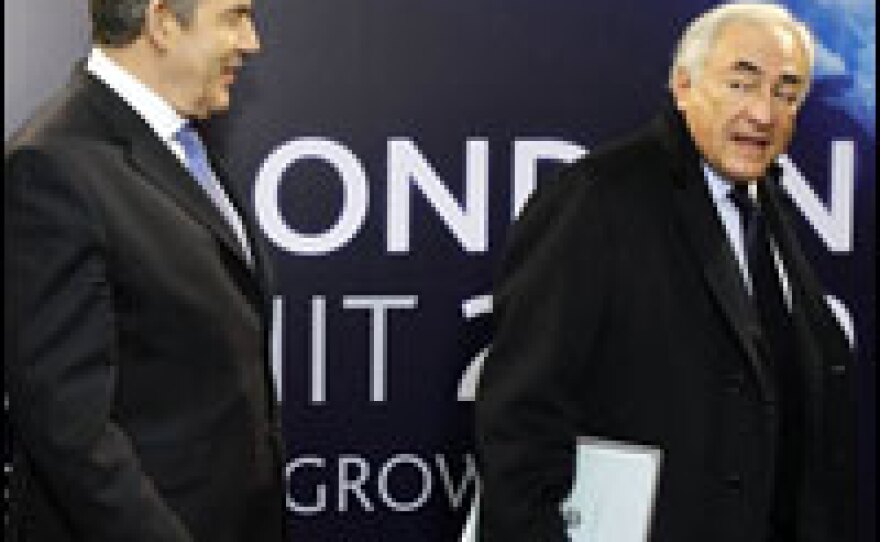Only a year ago, the International Monetary Fund's reason for being was in doubt. But the IMF carries a new sense of mission into its annual spring meeting this weekend after world leaders gave it a central role in fighting the global downturn.
John Lipsky, the first deputy managing director of the IMF, was clearly pleased with the IMF's new assignment as he stepped up to a lectern at a public appearance in Washington earlier this week.
"I yesterday went on the Web and discovered the title of this session: 'Can the IMF Really Save the World?' ....Wow."
The IMF's renewed role comes amid signs that the global recession will be longer and deeper than previously thought. According to a new IMF forecast, the world economy will shrink 1.3 percent in 2009, the first decline since World War II.
Down On The IMF
Amazingly, just a year ago, the world seemed to be wondering whether the IMF was worth saving, says Simon Johnson, former chief economist of the IMF. Central bankers and finance ministers had gathered in Washington for the spring meetings, just like they will this weekend.
"The general consensus among those people was, yes we may be heading into something of a global slowdown, but it's not really a big crisis, and in any case, the IMF is really of no use essentially to anyone," Johnson says.
Many doubts had arisen about its effectiveness. Many of its former nation/clients had quit borrowing from the IMF. That's partly because they were viewed as economic basket cases when they did, and partly because money had become available in the private financial markets.
'A Night-And-Day Change'
So global finance officials voted to cut 20 percent of the IMF's budget and staff. They thought the IMF had become irrelevant, Johnson says. But now that's been turned around.
"It's a huge change; it's a night-and-day change," Johnson says.
At their London summit earlier this month, leaders of the world's 20 biggest economies and emerging nations agreed to increase the IMF's monetary resources by more than $1 trillion. The G-20 also called on the IMF to take a greater role in monitoring the global economy and coordinating financial regulation.
Lipsky says the IMF embraces its new role.
"The endorsement and the resources being provided to the fund represent an historic change and potentially gives us the tools to adequately address the challenges before us," he says.
A Platinum Credit Line
Among the new tools the IMF has is a sort of platinum card credit line for countries with good policies. There's less stigma attached because economic basket cases don't qualify for the credit line.
But when bad things happen to good countries, like a global economic crisis, they can access the credit line and borrow what they need. Already, Mexico, Poland and Colombia have signed up.
But Johnson worries that the budget and staff cuts imposed on the IMF last year, which have not been restored, may hamper its ability to quickly implement programs to fight the crisis.
"It is striking and kind of surprising that the G-20 did not address the IMF budget issue," he says. "It gave them a trillion dollars, but didn't give them the means, the staff, the head count that you need to deploy that money in a sensible fashion."
A Bigger Stake For China?
A true resurgence of the IMF will also require more power for emerging nations like China, says Eswar Prasad, another former IMF official who's now a professor at Cornell and a scholar at the Brookings Institution. But, Prasad says, the current proposals to increase China's voice don't adequately reflect the size of its economy.
"This to me is absurd," he says. "I mean, at a time like this, when we are in a crisis, when we need to be making significant changes to an institution to make it more powerful. This is a time to make very drastic changes."
On basic reforms like this, says Johnson, the IMF makes glaciers look fast.
In any case, he says, no progress on this issue is likely to be made at this weekend's meetings. Most of the time will be spent consolidating the gains initiated at the G-20 summit.
Copyright 2022 NPR. To see more, visit https://www.npr.org. 9(MDAzMjM2NDYzMDEyMzc1Njk5NjAxNzY3OQ001))







